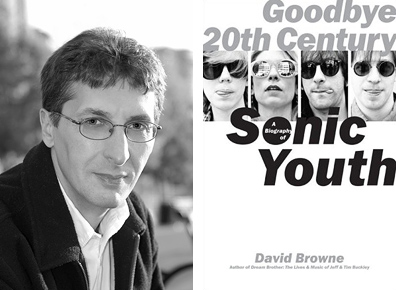Goodbye 20th Century, Hello New Sonic Youth Biography
Interview by Moshe Levy for saucerlike.com
 David Browne
David Browne is a freelance writer based in New York City. For many years, he was the music critic at Entertainment Weekly, where he started in 1990 as part of the magazine's launch. In the course of that job, he reviewed nearly 1300 albums and profiled everyone from Leonard Cohen and James Taylor to action film stars and the cast of "Beverly Hills 90210" (first season post-Shannon). In 1995, he was awarded a Music Journalism Award for excellence in criticism for an essay on the cultural significance of John Tesh (and no, he's not kidding).
His articles and reviews have appeared in a wide range of publications (the New York Times, Rolling Stone, New York Magazine, Blender, Spin, Sports Illustrated, Mojo) and websites (Time, the New Republic, the Poetry Foundation). In his rare free time, he also blogs for the Huffington Post and reviews new music releases for National Public Radio's website. David received his B.A. in journalism from New York University, after which he was an editor and writer at two now-defunct music magazines of the '80s, Music & Sound Output and High Fidelity. He began writing a column on indie rock for the New York Daily News, which, to his surprise and delight, turned into a full-time job at the newspaper.
David is also the author of three books: "Dream Brother: The Lives and Music of Jeff and Tim Buckley" (2001), "Amped: How Big Air, Big Dollars and a New Generation Took Sports to the Extreme" (2004) and the upcoming biography of Sonic Youth, to be published by Da Capo on May 26, 2008. David was kind enough to talk to us about his exciting new book.
Q: Why did you choose to write a book about Sonic Youth?
A: It was a combination of admiration and timing. Since it had been almost 15 years since the last book on them was published, the time felt right for a new one that would not just re-examine their early days but take readers right up to date. Since I’ve loved their music for over two decades, I also couldn’t pass up the chance to revisit all those records and write about them at greater length than in magazine or newspaper articles.
Q: Do you see any connection between the subject of this book and the subject of your two previous books?
A: I didn’t, but my wife did. After I told her about this idea, she said, “That’s your theme—people who do what they do out of love and suddenly find that what they do is becoming more accepted and mainstream, and how they seek to hold onto themselves and their identities.” (I’m paraphrasing, but that was the idea.) And she had a point. My first book, “Dream Brother,” was a dual biography of Jeff Buckley and his late father, Tim, both of whom absolutely embodied the idea of music as transcendence, of following one’s muse and bucking music industry pressure in order to satisfy one’s artistic vision. My second book, “Amped,” was about the extreme sports scenes—skateboarders, BMX riders, and so forth. I’ve always thought of those athletes as the sports equivalent of indie rockers. And given how increasingly mainstream those sports are getting (the Olympics, etc.), and how those athletes are all being hit upon by corporate sponsors, the same theme applies, but in a sports context. So a book on Sonic Youth, who have held onto their core values and identity over the course of over 25 years, is very much of a piece with cultural/artistic themes I’ve explored before.
Q: It is interesting to compare the Sonic Youth and the Jeff Buckley story. While Sonic Youth gained their mythological status through long years of hard work, Buckley became a myth with relatively small catalogue and in a short time. What does it imply about American culture?
A: It probably implies that America, along with lots of other places, loves a good “tragic young death” story—and certainly, we’ve seen enough of those in rock and roll. (I should add that I first interviewed Jeff in 1993, before he even made his first album, “Grace,” so I was a fan before his truly tragic passing.) And what’s also strikingly different about Sonic Youth is the almost complete absence of “Behind the Music”-style tabloid gossip: no drug overdoses, car crashes, busts with groupies, and so forth. They truly are all about the work ethic, which probably isn’t as sexy to the general public!
Q: Is it harder to write about living myths?
A: Absolutely. They give you feedback—as opposed to the deceased parties! But seriously: Yes, a little tricky, since I was trying to be both journalist and fan, which is always a bit tricky to navigate. Hopefully I was able to be both in the book.
Q: Were you a Sonic Youth fan before you wrote the book?
A: Absolutely. I first heard their music back in ’85 when I received a copy of “Bad Moon Rising” when I was working at a small, now defunct music magazine. I was both fascinated and terrified, but I kept listening—and I have a particularly vivid memory of playing an advance cassette (yes, cassette) of “Sister” and instantly falling in love with “Kotton Krown.” I’ve been following them ever since, and have interviewed them for articles for the late Musician magazine, the New York Times, and Entertainment Weekly, where I worked for many years. Thanks to me, “Dirty” was the album of the year in EW in 1992, for whatever that’s worth. To this day, I enjoy bike riding around Manhattan to their music more than any other band. The energy and the sound are perfect accompaniment. All of their albums are on my iPod.